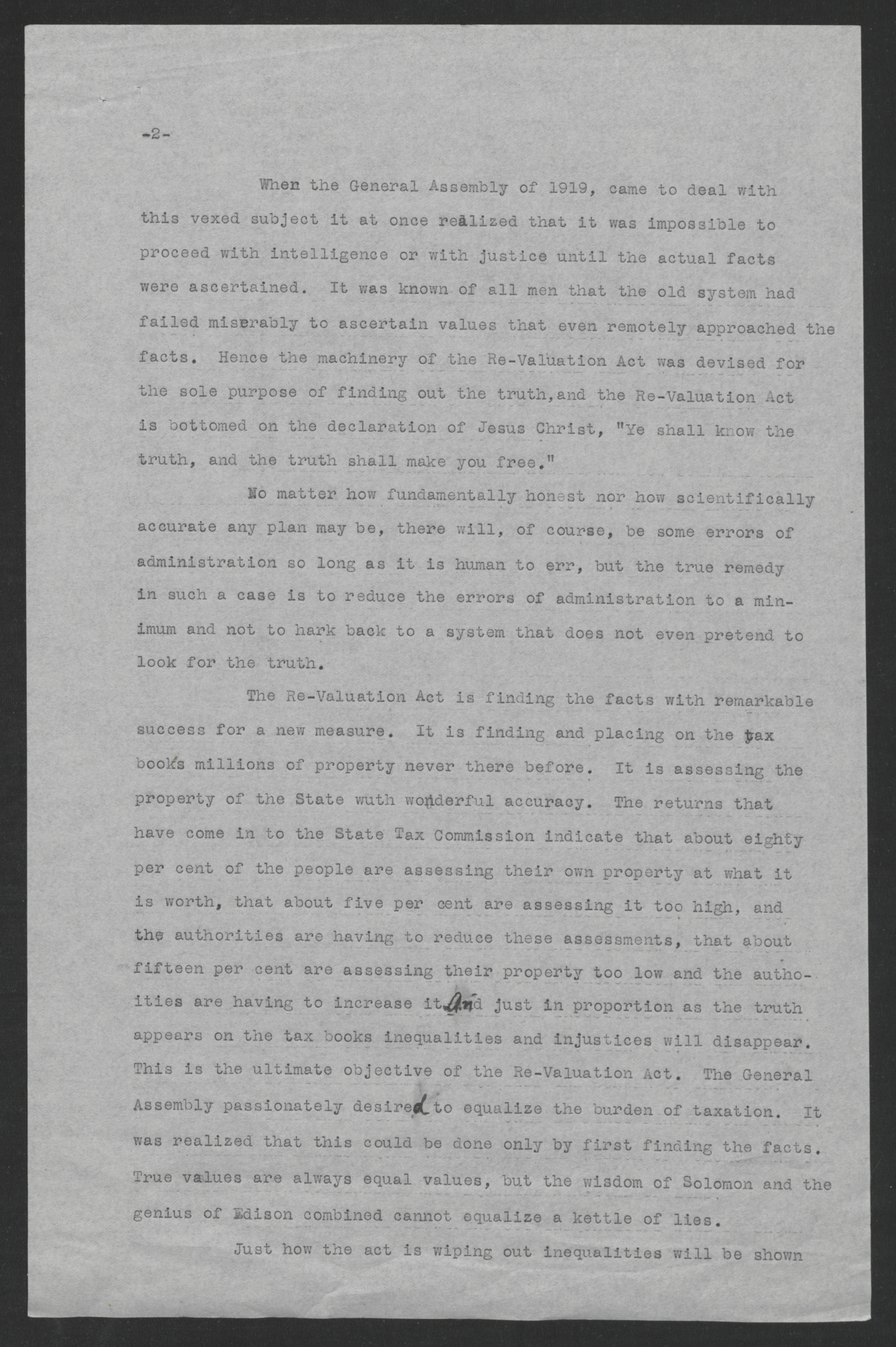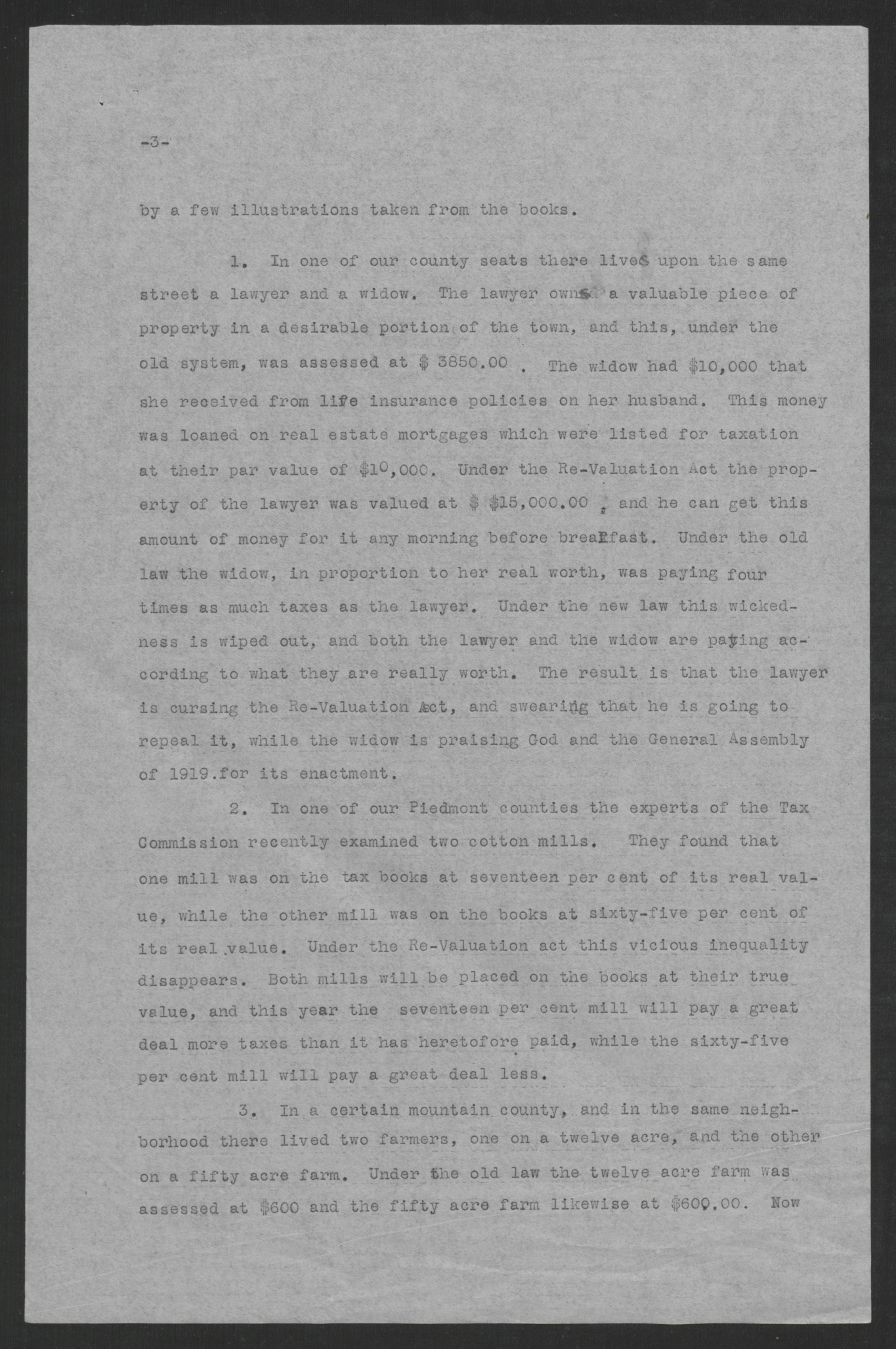(Released for Monday morning, Feb. 23rd, 1920)
"Ye Shall Know the Truth, and the Truth Shall Make You Free"
(By Governor T. W. Bickett)
For many years the State of North Carolina struggled along under the yoke of an unwise and unjust system of taxation. The yoke was not easy nor was the burden light. It produced a sense of irritation that has been constant and universal. The whole State was sore on the subject. Governor Glenn, in his Inaugural address, and two years later in his Biennial Message to the General Assembly, vigorously denounced the folly of maintaining in this State property values ridiculously low and tax rates terrifyingly high instead of maintaining true values and low rates.
Governor Kitchin, in his messages to the General Assembly in 1911, and 1913, points out the evils of undervaluing the property of the State.
During the first month of the Craig administration a banquet was given in the auditorium in Raleigh in honor of Governor Craig and Senator Simmons. At this banquet Governor Craig made a speech in which he insisted that the General Assembly of 1913, should not levy any taxes, but should provide for a general re-assessment of the property of the State at its true value, and after this was done that the General Assembly should be called into special session and levy a tax based upon the true value of the property of the state disclosed by a general re-assessment.
The Legislature did not adopt this course, but appointed a Constitutional Commission to consider, among other things, the subject of taxation. This Commission made its report, and at a special session of 1914, a taxation amendment was submitted to the people and was voted down at the polls that year. When the people voted down the taxation amendment they re-affirmed the present constitutional provision which emphatically requires that all property shall be listed by a uniform rule according to its true value in money.
When the General Assembly of 1919, came to deal with this vexed subject it at once realized that it was impossible to proceed with intelligence or with justice until the actual facts were ascertained. It was known of all men that the old system had failed miserably to ascertain values that even remotely approached the facts. Hence the machinery of the Re-Valuation Act was devised for the sole purpose of finding out the truth, and the Re-Valuation Act is bottomed on the declaration of Jesus Christ, "Ye shall know the truth, and the truth shall make you free."
No matter how fundamentally honest nor how scientifically accurate any plan may be, there will, of course, be some errors of administration so long as it is human to err, but the true remedy in such a case is to reduce the errors of administration to a minimum and not to hark back to a system that does not even pretend to look for the truth.
The Re-Valuation Act is finding the facts with remarkable success for a new measure. It is finding and placing on the tax books millions of property never there before. It is assessing the property of the State with wonderful accuracy. The returns that have come in to the State Tax Commission indicate that about eighty per cent of the people are assessing their own property at what it is worth, that about five per cent are assessing it too high, and the authorities are having to reduce these assessments, that about fifteen per cent are assessing their property too low and the authorities are having to increase it. And just in proportion as the truth appears on the tax books inequalities and injustices will disappear. This is the ultimate objective of the Re-Valuation Act. The General Assembly passionately desired to equalize the burden of taxation. It was realized that this could be done only by first finding the facts. True values are always equal values, but the wisdom of Solomon and the genius of Edison combined cannot equalize a kettle of lies.
Just how the act is wiping out inequalities will be shown by a few illustrations taken from the books.
1. In one of our county seats there lives upon the same street a lawyer and a widow. The lawyer owns a valuable piece of property in a desirable portion of the town, and this, under the old system, was assessed at $3850.00. The widow had $10,000 that she received from life insurance policies on her husband. This money was loaned on real estate mortgages which were listed for taxation at their par value of $10,000. Under the Re-Valuation Act the property of the lawyer was valued at $15,000.00, and he can get this amount of money for it any morning before breakfast. Under the old law the widow, in proportion to her real worth, was paying four times as much taxes as the lawyer. Under the new law this wickedness is wiped out, and both the lawyer and the widow are paying according to what they are really worth. The result is that the lawyer is cursing the Re-Valuation Act and swearing that he is going to repeal it, while the widow is praising God and the General Assembly of 1919 for its enactment.
2. In one of our Piedmont counties the experts of the Tax Commission recently examined two cotton mills. They found that one mill was on the tax books at seventeen per cent of its real value, while the other mill was on the books at sixty-five per cent of its real value. Under the Re-Valuation Act this vicious inequality disappears. Both mills will be placed on the books at their true value, and this year the seventeen per cent mill will pay a great deal more taxes than it has heretofore paid, while the sixty-five per cent mill will pay a great deal less.
3. In a certain mountain county, and in the same neighborhood there lived two farmers, one on a twelve acre, and the other on a fifty acre farm. Under the old law the twelve acre farm was assessed at $600 and the fifty acre farm likewise at $600.00. Now when these farmers received their questionnaires the twelve acre farmer swore that his land was worth $650. The fifty acre farmer swore that his land was worth $4,000.00. Under the Re-Valuation Act the two honest citizens, when they had an opportunity to do so, corrected a rank injustice.
4. Down in Wilson county a man had a son and a daughter. In his will he stated that he desired to give them an equal amount of property. He had a farm which, in his will, he said was worth $10,000, and it is worth it. It will bring that amount on the market any morning. He gave this farm to his son, and then he gave to his daughter $10,000 in money. When the Sheriff came around he collected from the daughter five times as much taxes as he did from the son. The daughter naturally complained about it and asked the Sheriff why she should pay five times as much taxes as her brother, when their father had given them, as stated in his will, exactly the same amount of property. The Sheriff explained to her that the land was assessed at only $2,000, though he admitted that it was worth $10,000, while the money was assessed at $10,000, and that he (the sheriff) had no power to change it. The Re-Valuation Act does change it. It carries out the will of the dead father and makes the son and the daughter equal before the law.
The correction of inequalities like those cited above, and there are hundreds of thousands of them in North Carolina, justify the statement that the Re-Valuation Act is bottomed on the celestial declaration, "Ye shall know the truth and the truth shall make you free."
Date:
Sender:
Repository:
Collection:
Places:
»» North Carolina »» Wilson








